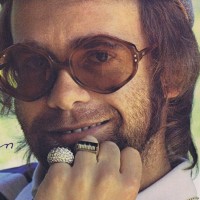It’s an album that plays with all of the disjointed profundity of a greatest hits project, all of the kitchen-sink self-indulgence of your typical 1970s-era double album, and all of the outsized personality we’ve come to expect from the former Reginald Kenneth Dwight.
The truth is, for all of its many radio-ready splendors, Goodbye Yellow Brick Road could have benefitted from a single-disc edit. (“Jamaica Jerk-Off”? Really?) But Elton John and lyricist Bernie Taupin were in the midst of a platinum-selling, career-defining run and, in some ways, Goodbye — which somehow arrived just eight months after Don’t Shoot Me, I’m Only the Piano Player on October 5, 1973 — represents a fizzy, all-over-the-map creative peak. They’d written it over a period of days at the Pink Flamingo Hotel in Kingston, Jamaica, with an initial plan to record there. Subsequent sessions at the Chateau d’Herouville in France would only last two weeks.
There follows, perhaps inevitably, a steam-of-consciousness to the album, as Elton John’s Goodbye Yellow Brick Road bounces from epic prog-influenced conceits (“Funeral for a Friend”) to lovestruck balladry (“Candle in the Wind”), from funky pop gems (“Bennie and the Jets”) to these moments of debauched grandeur (“Goodbye Yellow Brick Road”), from slicked-back pub rock (“Saturday Night’s Alright for Fighting”) to one of Bernie Taupin’s most overtly literary constructions (“The Ballad of Danny Bailey”).
Sparked by an ensconced period with Taupin and his regular working band, as the Band had been before during its Basement Tapes period with Bob Dylan, Elton John didn’t emerge with anything that held together so well. Still, as Goodbye Yellow Brick Road ballooned into a double-album set, a larger theme (similar, actually, to the Band’s, as well) of lament for the disappearing American culture, and for lost folkways, would emerge. John and Taupin made it their own by, at least in part, viewing this through the lens of Hollywood films.
Not that this was easy to divine, as the album ultimately became defined by its string of early-1970s hits. And yet, Goodbye Yellow Brick Road is no worse for its failure to hold together as A Big Idea.
This album, far more than the more personal, more direct and admittedly more cohesive statements that came before, illustrates as well anything he ever did just why Elton John became Elton John — and how. Goodbye Yellow Brick Road, a project as over-the-top as its singer, is a magnum opus of ambition, of emotion and glitz, and of distilled popcraft.
- Nick DeRiso’s Best of 2015 (Rock + Pop): Death Cab for Cutie, Joe Jackson, Toto + Others - January 18, 2016
- Nick DeRiso’s Best of 2015 (Blues, Jazz + R&B): Boz Scaggs, Gavin Harrison, Alabama Shakes - January 10, 2016
- Nick DeRiso’s Best of 2015 (Reissues + Live): John Oates, Led Zeppelin, Yes, Faces + others - January 7, 2016





A single disc edit? No way. You definitely got that wrong. The album was a huge success so why would you criticize that? But you only point to Jamaica Jerk Off as a throwaway song not understanding that it is inevitably a “fun song” for the band at the time. This album is a gem. A top ten for the desert island scenario.